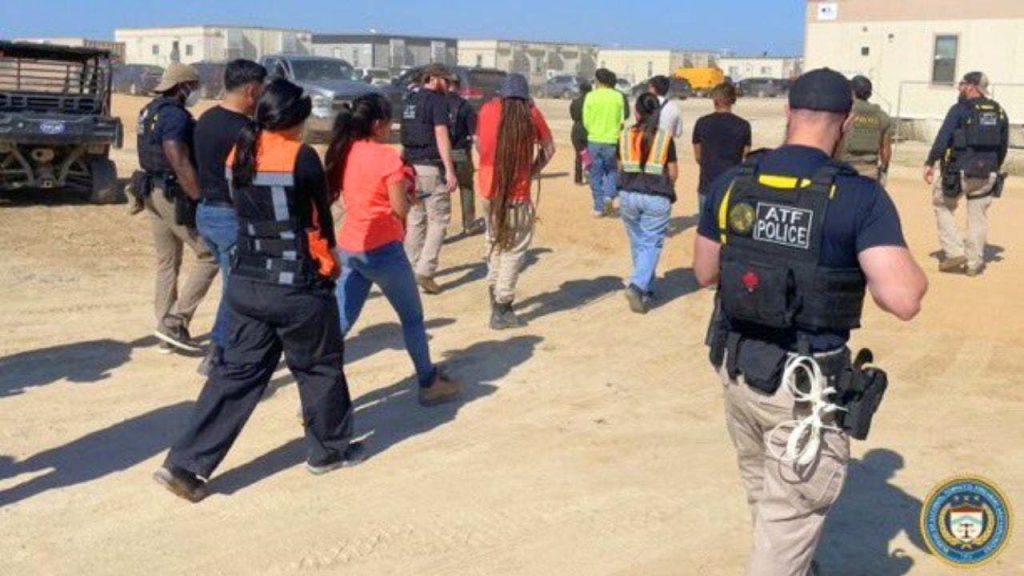Trump Suggests Skilled Foreign Workers Could Train Americans While Supporting Immigration Enforcement
In a nuanced statement following the recent ICE raid at a Hyundai battery plant in Georgia, former President Donald Trump balanced support for immigration enforcement with pragmatic concerns about America’s industrial competitiveness. The raid, which resulted in the detention of 475 workers—primarily South Korean nationals—has highlighted tensions between strict immigration policies and the need for specialized expertise in emerging industries.
Trump acknowledged that while ICE was justified in arresting individuals working illegally, he also recognized a practical reality: America currently lacks sufficient domestic expertise in certain advanced manufacturing sectors. “If you don’t have people in this country right now that know about batteries, maybe we should help them along,” Trump told reporters, extending this logic to other industries like shipbuilding and computer manufacturing where specialized knowledge has diminished in the American workforce. This perspective reflects a growing awareness that rebuilding America’s industrial capacity may require temporary foreign expertise to train domestic workers, especially in fields where technical knowledge has eroded over decades of outsourcing.
The former president elaborated on a potential solution, suggesting that foreign experts could be allowed to remain in the country temporarily to transfer their knowledge to American workers. “We’re going to have to train people,” Trump stated, emphasizing that the most effective approach would involve bringing in people with demonstrated expertise who could then develop America’s domestic workforce. This position illustrates a more complex immigration stance than is often attributed to Trump—one that recognizes the strategic value of certain skilled immigrants while still maintaining strong enforcement against unauthorized entry and employment. The statement represents a delicate balancing act between strict immigration enforcement and practical economic considerations in an increasingly competitive global landscape.
Later, Trump took to his Truth Social platform to further clarify his position, directly addressing foreign companies investing in the United States. He welcomed their investments while emphasizing the importance of respecting American immigration laws, promising to make it “quickly and legally possible” for companies to bring in highly skilled workers when necessary. Trump’s message included a reciprocal expectation: “What we ask in return is that you hire and train American Workers.” This framework envisions foreign expertise as a temporary bridge to developing domestic capabilities rather than a permanent replacement for American workers. The approach suggests a transactional view of immigration policy that prioritizes national economic interests while maintaining enforcement boundaries.
The ICE operation itself has created diplomatic tensions, with the South Korean government expressing “concern and regret” over the raid despite reaching an agreement with the United States to secure the release of the detained workers. President Lee Jae Myung’s administration has arranged for a charter plane to return the workers to South Korea in the coming days, highlighting the international implications of domestic immigration enforcement actions. Homeland Security Investigations chief Steven Schrank provided context for the enforcement action, noting that the workers had various immigration violations—some had crossed the border illegally, others had overstayed visas, and some had entered under visa waivers that explicitly prohibited employment. Many were employed through subcontractors rather than directly by Hyundai, which owns the site but has maintained that none of the arrested individuals were directly employed by the company.
The Georgia raid stands as one of the largest workplace immigration enforcement actions in recent years, marking a significant moment in the ongoing national debate about immigration policy, industrial strategy, and international relations. Trump’s response reveals the complex interplay between these factors—acknowledging the need for enforcement while recognizing practical economic realities. As America seeks to rebuild its manufacturing capacity, particularly in strategic sectors like battery production, policymakers face difficult questions about how to balance strict immigration enforcement with the practical need for specialized expertise that may not currently exist within the domestic workforce. Trump’s statements suggest an approach that maintains enforcement while creating legal pathways for knowledge transfer that could ultimately strengthen American industrial capabilities through a combination of foreign expertise and American labor.


